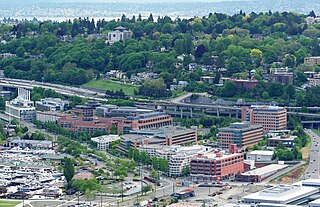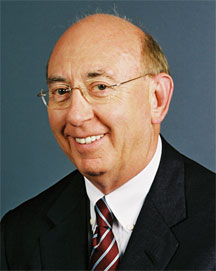Related Research Articles

Wacław Szybalski was a Polish-American medical researcher, geneticist and professor of oncology at the McArdle Laboratory for Cancer Research, University of Wisconsin–Madison Medical School.

The Fred Hutchinson Cancer Center, formerly known as the Fred Hutchinson Cancer Research Center and also known as Fred Hutch or The Hutch, is a cancer research institute established in 1975 in Seattle, Washington.
The National Cancer Institute (NCI) coordinates the United States National Cancer Program and is part of the National Institutes of Health (NIH), which is one of eleven agencies that are part of the U.S. Department of Health and Human Services. The NCI conducts and supports research, training, health information dissemination, and other activities related to the causes, prevention, diagnosis, and treatment of cancer; the supportive care of cancer patients and their families; and cancer survivorship.

Roswell Park Comprehensive Cancer Center is a cancer research and treatment center located in Buffalo, New York. Founded by surgeon Roswell Park in 1898, the center was the first in the United States to specifically focus on cancer research. The center is usually called Roswell Park in short. The center, which conducts clinical research on cancer as well as the development new drugs, provides advanced treatment for all forms of adult and pediatric cancer, and serves as a member of the National Comprehensive Cancer Network. Roswell Park Comprehensive Cancer Center is as of 2019, the only upstate New York facility to hold the National Cancer Institute designation of "comprehensive cancer center".
NCI-designated Cancer Centers are a group of 72 cancer research institutions in the United States supported by the National Cancer Institute.

Houston Lee Moffitt Cancer Center & Research Institute is a nonprofit cancer treatment and research center located in Tampa, Florida. Established in 1981 by the Florida Legislature, the hospital opened in October 1986 on the University of South Florida's campus. Moffitt is one of two National Cancer Institute-designated Comprehensive Cancer Centers based in Florida. In 2021, U.S. News & World Report ranked Moffitt Cancer Center as a top 30 cancer hospital in the United States.

The University of Wisconsin School of Medicine and Public Health (UWSMPH) is a professional school for the study of medicine and public health at the University of Wisconsin–Madison. It is one of only two medical schools in Wisconsin, along with the Medical College of Wisconsin in Milwaukee, and the only public one.

UW Health University Hospital is a 614-bed academic regional referral center with 127 outpatient clinics, located on the western edge of the University of Wisconsin–Madison's campus in Madison, Wisconsin. It is an American College of Surgeons designated Level I adult and pediatric trauma center, one of only two in Wisconsin.
George Wilding was the director of the UW Carbone Cancer Center and Anderson Professor of Clinical Oncology of the Department of Medicine of the UW School of Medicine and Public Health and an internationally recognized leader and clinician in the fields of oxidative stress and prostate cancer prevention and therapy. He is a member of the editorial board of the journal “The Prostate”.
The University of Maryland Marlene and Stewart Greenebaum Comprehensive Cancer Center (UMGCCC) is a National Cancer Institute (NCI)-designated comprehensive cancer center located in Baltimore, Maryland.

The McArdle Laboratory for Cancer Research is a basic cancer research facility located on the University of Wisconsin–Madison campus in Madison, Wisconsin. It houses the university's Department of Oncology. The staff of the McArdle Laboratory numbers approximately 200. Twenty-eight faculty members lead research groups focused on various fields such as cancer virology, signal transduction, cell cycle, cancer genetics, and carcinogenesis.

The University of Wisconsin–Madison is a public land-grant research university in Madison, Wisconsin. Founded when Wisconsin achieved statehood in 1848, UW–Madison is the official state university of Wisconsin and the flagship campus of the University of Wisconsin System. It was the first public university established in Wisconsin and remains the oldest and largest public university in the state. UW–Madison became a land-grant institution in 1866. The 933-acre (378 ha) main campus, located on the shores of Lake Mendota, includes four National Historic Landmarks. The university also owns and operates the 1,200-acre (486 ha) University of Wisconsin–Madison Arboretum, located 4 miles (6.4 km) south of the main campus, which is also a National Historic Landmark.

John E. Niederhuber, MD was the 13th director of the National Cancer Institute (NCI), from 2006 until July, 2010, succeeding Andrew von Eschenbach, who went on to become a director at biotechnology firm BioTime. A nationally renowned surgeon and researcher, Dr. Niederhuber has dedicated his four-decade career to the treatment and study of cancer - as a professor, cancer center director, National Cancer Advisory Board chair, external advisor to the NCI, grant reviewer, and laboratory investigator supported by NCI and the National Institutes of Health. He is now Executive Vice President/CEO Inova Translational Medicine Institute and Inova Health System and co-director, Johns Hopkins Clinical Research Network.

Virginia S. Hinshaw is a scientist with expertise in microbiology, virology and influenza resulting in numerous publications. She served as Vice-Chancellor at U of Wisconsin Madison and Chancellor at University of Hawai'i Manoa campus.
Professor Minesh P. Mehta, MD, FASTRO, is an American radiation oncologist and physician-scientist of Indian origin, Ugandan birth, Zambian Schooling and American Training, who contributed to the field of oncology for more than two and half decades.
The Collaborative Ependymoma Research Network (CERN) Foundation is a nonprofit organization composed of scientists and adult and pediatric cancer researchers who work together to develop new treatments for Ependymoma, a type of primary brain or spinal cord tumor that occurs in both children and adults, and improve the outcomes and care of patients. The organization is headquartered in Dayton, Ohio, USA.
Herbert Irving Comprehensive Cancer Center (HICCC) is a National Cancer Institute NCI-designated Cancer Center, founded in 1911 and located at NewYork-Presbyterian / Columbia University Irving Medical Center (NYP/CUIMC).

Fred Joseph Ansfield, M.D. was an American pioneer of medical oncology. He was a leader in applying 5-FU (5-Fluorouracil) to humans, demonstrating its effectiveness as a chemotherapy drug. Ansfield co-founded the American Society of Clinical Oncology (ASCO) in 1964, along with Harry Bisel, Arnoldus Goudsmit, Herman H. Freckman, Robert W. Talley, William Wilson and Jane Cooke Wright. He served as ASCO's third president (1966-1967).
Susan Carol Hagness is an American electrical engineer and applied electromagnetics researcher. She is the Philip Dunham Reed Professor and Department Chair of Electrical and Computer Engineering at the University of Wisconsin–Madison.
Pallavi Tiwari is an Indian American biomedical engineer who is a professor at the University of Wisconsin–Madison. Her research considers the development of computer algorithms to accelerate the diagnosis and treatment of disease. She was elected Fellow of the National Academy of Inventors.
References
- ↑ "History | McArdle Laboratory for Cancer Research". mcardle.wisc.edu. Retrieved 2018-11-09.
- 1 2 "UWCCC from 1970 – 2000". Carbone Cancer Center. Retrieved 2018-11-09.
- 1 2 "Big Ten Cancer Research Consortium » University of Wisconsin Carbone Cancer Center". www.bigtencrc.org. Retrieved 2018-11-09.
- 1 2 3 Authority, University of Wisconsin Hospitals and Clinics. "Significant Accomplishments and Discoveries". UW Health. Retrieved 2018-11-09.
- ↑ "Funeral arrangements set for Carbone, cancer pioneer". news.wisc.edu. Retrieved 2018-11-09.
- ↑ "Almanac". news.wisc.edu. Retrieved 2018-11-09.
- 1 2 "Wilding named Cancer Center director". news.wisc.edu. Retrieved 2018-11-09.
- 1 2 "At the Helm: Dr. Howard Bailey, Director of the UW Carbone Cancer Center". University Of Wisconsin - Department of Medicine. 2015-03-31. Retrieved 2018-11-09.
- ↑ "Campus was hopping, at a summertime pace, while you were gone". news.wisc.edu. Retrieved 2018-11-09.
- ↑ "About the University of Wisconsin Cancer Center". Carbone Cancer Center. Retrieved 2018-11-12.
- ↑ "About WON". UWCCC Research. Retrieved 2018-11-12.
- ↑ "Program Areas". UWCCC Research. Retrieved 2018-11-12.